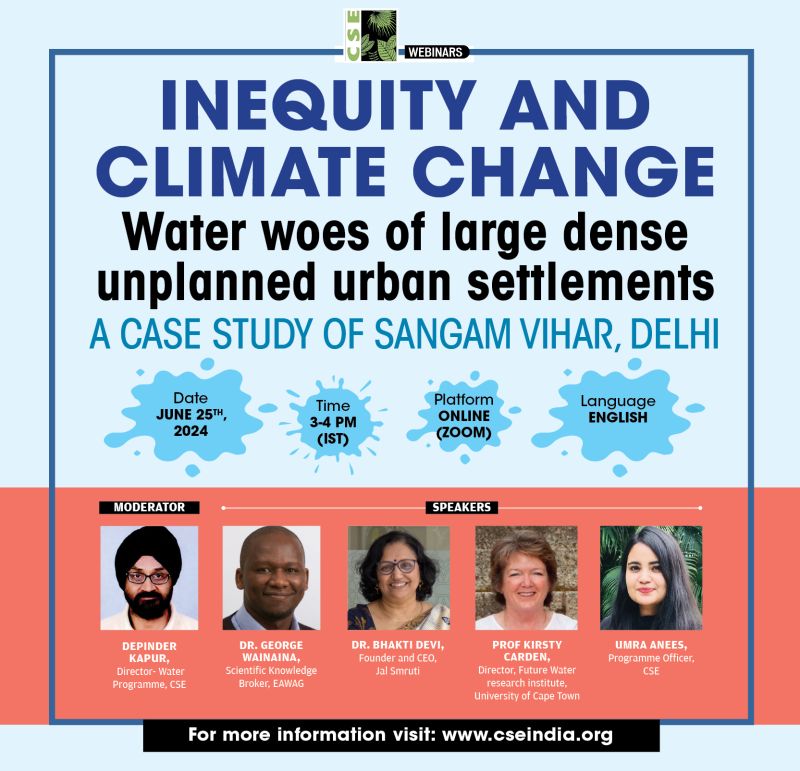Webinar on “Inequity and climate change: Water woes of our large dense unplanned urban settlements” A Case study of Sangam Vihar, Delhi : CSE

![]()
Date: Webinar on June 25, 3 PM IST
The Centre for Science and Environment (CSE) is a public interest research and advocacy organisation based in New Delhi. CSE researches into, lobbies for and communicates the urgency of development that is both sustainable and equitable. The scenario today demands using knowledge to bring about change. In other words, working India’s democracy. This is what we aim to do. The challenge, we see, is two-pronged. On the one hand, millions live within a biomass based subsistence economy, at the margins of survival. The environment is their only natural asset. But a degraded environment means stress on land, water and forest resources for survival. It means increasing destitution and poverty. Here, opportunity to bring about change is enormous. But it will need a commitment to reform – structural reform- in the way we do business with local communities. On the other hand, rapid industrialization is throwing up new problems: growing toxification and a costly disease burden. The answers will be in reinventing the growth model of the Western world for ourselves, so that we can leapfrog technology choices and find new ways of building wealth that will not cost us the earth. Our aim is to raise these concerns, participate in seeking answers and in pushing for answers, transforming these into policy and so practice. We do this through our research and by communicating our understanding through our publications. We call this knowledge-based activism. We hope we will make a difference.
Join CSE’s webinar on June 25, 3 PM IST, where we discuss the groundbreaking ‘Water & Wastewater Visioning’ study for Sangam Vihar, Delhi.
Urbanisation at a crossroads: The rapid pace of urbanisation in the Global South has been accompanied by severe inequity in urban habitats,
mushrooming of dense unplanned settlements, and poor access to basic services such as water and sanitation.
Learn about tackling water crises in dense urban settings amid climate risks
Zoom link
Read the report here: Water and Wastewater Visioning for Large, Dense Unplanned Urban Settlements in an Era of Climate Risk
Cities, especially, large metro cities, are at increasing climate risk-induced water stress and flooding. Large, dense, unplanned urban settlements, already facing a crisis of water supply, wastewater and storm-water management, will bear the brunt of climate-change impact.
Sangam Vihar, Delhi, is representative of such a large, dense, unplanned urban settlement. Spread over 5 sq. km and housing a population of more than a million, it is the largest unauthorized colony in Asia.
This research offers valuable insights in terms of approach, methodology and analysis of urban water, wastewater and storm-water challenges of such settlements. It explores whether retrofitting solutions for water supply, wastewater and storm water can work for such unplanned settlements, and reimagines and explores decentralized sanitation and storm-water management solutions that are firmly anchored on principles of circular economy, equity and justice.

